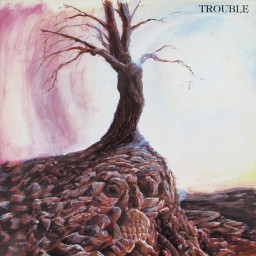 Review by Sonny for Trouble - Psalm 9 (1984)
Review by Sonny for Trouble - Psalm 9 (1984)
Like Saint Vitus, Trouble formed in 1978, but also like their californian counterparts they didn't release their debut album until 1984. In fact Vitus' and Trouble's self-titled debuts were only released a month apart, with "Saint Vitus" issuing forth in February and "Trouble" (later retitiled "Psalm 9") following in March. Preceeding the album, the track "Assassin" was released as a single, backed by a doomy cover of Cream's "Tales of Brave Ulysses", which was decent enough, although Eric Wagner does struggle with some of the higher registers. "Assassin" was chosen as the lead single, I suspect, because of its strong resemblance to NWOBHM stalwarts Diamond Head in an attempt to garner some traction with the fans of the english heavy metallers.
Trouble are well-known for their Christian-themed lyrics but, in all honesty, I never realised this for the longest time because the lyrical content doesn't affect the darkness of the music at all. Their beliefs don't become that apparent until you actually sit down and go over the lyric sheet. The preachiness and happy-clappy demeanour of so many Christian-themed acts was something that Trouble managed to avoid, concentrating more on the music and less on converting the long-haired masses of young metalheads who comprised their prospective audience. This is a band equally at home pouring vitriol on unfeeling leaders with lyrics like "Come on people, let me hear you say, You fuckin' Bastards, you're gonna pay" as they are beseeching their lord for mercy with "I will praise thee O Lord, I will sing praise in thy name, Don't forget the cry of the humble, Have mercy on me".
Instrumentally, "Trouble" has quite a clean and well-produced sound, much more akin to Black Sabbath than the grimy grittiness of Saint Vitus' more distorted and downtuned debut. The band also employ a wider variation of pacing than is often encountered within the context of orthodox doom metal, but make no bones about it, when they want to, they are more than capable of bringing the doom. Despite their penchant for traditional metal-paced riffs, the downtuned and distorted guitar sound often makes the material feel slower and doomier than maybe it actually is. As well as varying the pacing from track to track they are also apt to change the velocity of the riffs within a given track, such as on the opener, "The Tempter," where, after an ominous tympanic intro, the riff crawls unctiously from the speaker and Eric Wagner intones a warning from satan himself before the band change up a gear and kick into a riff Angel Witch would have been proud of as the forces of good rally themselves. This then alternates with the slow, crawling riff as The Tempter tries his powers of pursuasion on man and quickens again when The Good resist. There is even a rocking, bluesy riff accompanying the guitar solo after the second verse, typifying a diversity that more doom-centric releases may lack. That said though, when they embrace a doomier, darker side, such as on "Victim of the Insane" then they are perfectly capable of conjuring up as sinister and ominous an atmosphere as anyone.
Vocalist Eric Wagner is, of course, a legendary name within doom metal circles, although I am sure his vocal style isn't to everyone's taste. Sure, he does sound like a strangled cat occasionally, but, similarly to Scott Reagers on Saint Vitus debut, his higher-pitched style does act as an effective counter and contrast to the low-tuned guitar and bass assault of the riffs. Unconventionally pleasing and technically restricted vocals, of which Wagner's are a solid example, have long since become the norm within doom metal circles and Wagner, Reagers and company, in the spirit of Ozzy Osbourne, were a big factor in that.
I cannot claim that I hold Trouble's debut up as an absolute top-drawer traditional doom metal release as, in all honesty, it doesn't commit enough to the doom aesthetic for me, despite showing promise with the likes of "Victim of the Insane". There are also a couple of clunkers among the tracklisting, with "Revelation (Life or Death)" and the instrumental "Endtime" in particular just not sounding coherent enough within the context of the rest of the album. That said, there is enough quality elsewhere to provide a really solid listening experience and this is ultimately an album that further bridges the gap between traditional heavy metal and doom metal proper and as such deserves the time and respect of all doom metal fans.
